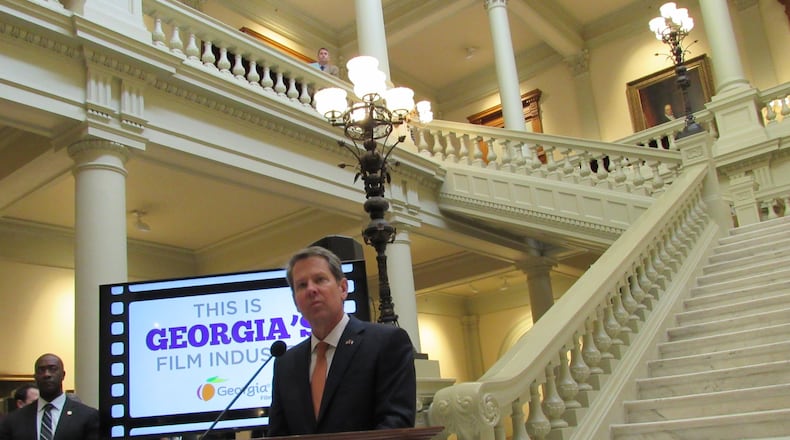During last year’s season of “The Georgia Legislature: Film Day,” the state’s filmmaking tax credit was the star of the show as usual, with glee at the booming industry and concern over social issues both driving the narrative.
The latest episode involved some cast changes, with Gov. Brian Kemp welcoming the crowd as his predecessor Nathan Deal has in years past, but the specter of legislation that some fear could spook Hollywood was back in what’s become a recurring role.
“I’m the worrier in chief,” said Kris Bagwell, executive vice president at EUE/Screen Gems Studios, where productions including the 2018 Marvel blockbuster “Black Panther” have set up shop. “The whole production industry is a creative, inclusive community.”
Deal vetoed a “religious liberty” bill that years ago prompted boycott threats from Walt Disney Co. and Marvel Studios, whose locally filmed projects have included “Avengers: Infinity War” and the upcoming “Avengers: Endgame.” Last year, legislation that would have let taxpayer-funded adoption agencies deny gay couples died, and former Lt. Gov. Casey Cagle’s war with Delta Air Lines over its decision to end discounts for National Rifle Association members faded to black.
But Kemp has said he’d sign state legislation mirroring the federal Religious Freedom and Restoration Act that President Bill Clinton signed into law in 1993. The proposed “heartbeat bill,” which would outlaw most abortions once a doctor detects a fetal heartbeat, is another hot button this year.
No one in the celebratory crowd at a recent Georgia Film Day event mentioned any specifics when discussing social issues, though.
“Our folks have been very busy,” said LaRonda Sutton, the board president of Women in Film & Television Atlanta and the founding director of the Mayor’s Office of Film & Entertainment for the city of Atlanta. “As long as we don’t do anything silly and non-inclusive, we’ll be fine.”
Kemp spoke for about five minutes at the event, held in the Georgia Capitol rotunda. Steering clear of politics, he focused on economic highlights.
“Like you, I’m proud to see the peach logo at the end of a new movie or TV show,” he said. “When you combine our state’s diverse landscape, deep talent pool, convenient and world-class airport and business-friendly climate, Georgia offers the complete package.”
Some 455 productions were shot in Georgia in fiscal year 2018, with an estimated economic impact of $9.5 billion, according to the Georgia Department of Economic Development.
Lee Thomas, the head of the state’s film office, said she expected production to reach a new high this year.
“We have a great track record,” said Thomas, recently named the 2019 Georgian of the Year by Georgia Trend magazine. “It feels like the brand is blowing up right now.”
Georgia’s tax legislation, first signed into law in 2005, allows production companies to earn tax credits for up to 30 percent of what they spend here. It’s become a third rail in state politics, untouchable by even the fiercest fiscal conservatives. Even as he called for a sweeping review of other incentives he saw as wasteful during last year’s race for governor, Candidate Kemp made clear his support for the one benefiting the film industry.
“We’re going to work with the hardworking Georgians that are here and welcome those that are coming to our state to do business just like we have for a very long time in our state,” he said in response to a question about the film tax credit during a 2018 campaign stop in Cartersville. “We just need to keep supporting what we have and keep the low cost of doing business in our state.”
A Kemp spokesman said his office still plans to vet other tax credits, though no formal plan has been announced.
Industry leaders, meanwhile, are emphasizing its statewide reach. Kathy Oxford, an economic development recruiter from Lamar County, noted the surge in local tax revenue and business from the one-month shoot of HBO’s “Sharp Objects” miniseries. The best part of the $500,000 or so economic benefit, she said, was that it didn’t stress the local infrastructure.
“We don’t have to build new schools and classrooms,” she said of her county, about 60 miles south of Atlanta. “And they clean up after themselves.”
House Speaker David Ralston, long a steadfast supporter of the film tax credit, wants to make permanent a legislative committee launched earlier this year devoted to crafting legislation related to the film and entertainment business.
He illustrated the industry’s wide-ranging potential in noting the professional roots actress Reese Witherspoon has put down in Georgia.
Not only has she filmed movies including “The Good Lie” and “Devil’s Knot” here, but her Draper James fashion lifestyle brand also announced a collaboration with Savannah College of Art and Design students for a “Mommy + Me” collection in 2017, about the time her Buckhead Draper James store opened. The limited-edition collection debuted last year, and Draper James still partners with a sewing plant in Ralston’s native Blue Ridge for its jeans.
During the often vitriolic governor’s race, it was clear which side many entertainment industry figures preferred, to the extent that Kemp would sometimes turn Stacey Abrams’ strong celebrity support into a stump-speech talking point in rural Georgia.
An artists boycott was supposedly in the works once the highly contested election was certified, but it never materialized. Actress and producer Alyssa Milano, however, recently called on Hollywood to ditch Georgia again, this time over the new abortion restrictions.
Whatever qualms the film industry has with the Kemp administration’s socially conservative policies were on muted display at best at the film event last week. Several people wore red outfits in silent protest of the heartbeat bill, but absent were the columns of women in “Handmaid’s Tale” cloaks and raucous protesters seen in recent days.
Actor Ric Reitz, the board president of the Atlanta local of the Screen Actors Guild-American Federation of Television and Radio Artists, projected optimism.
“He’s on board,” he said of Kemp. “The speaker’s on board. We have a very good feeling about the direction of this administration.”
J.B. Vick, the president of the Lot 108 studio in Atlanta, hopes for less mystery by Film Day 2020.
“What the film industry needs is clarity,” he said. “The religious liberty bill is buried this year, so it’s a non-issue. But will it be brought up next year? Who knows? That’s what we need to know.”
WHY IT MATTERS
Some 455 film and television productions were shot in Georgia in fiscal year 2018, taking advantage of state legislation that allows production companies to earn tax credits for up to 30 percent of what they spend here. Their economic impact is estimated at $9.5 billion, according to the Georgia Department of Economic Development.
Keep Reading
The Latest
Featured





